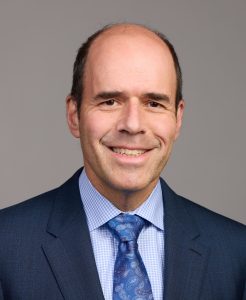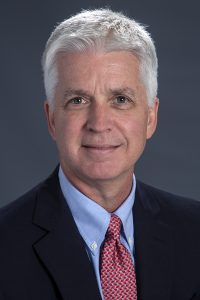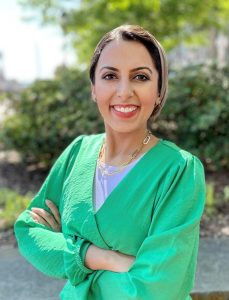Having “survived,” as he jokingly said, his first ABR board meeting last month, Kenneth Rosenzweig, MD, is eager to start work as a Trustee.
New Trustees spend initial meetings getting accustomed to their duties. Their status as board members begins at the end of that week. Dr. Rosenzweig used the time to gain his footing for the new role.
“The board meeting was great,” he said. “It was good to start getting familiar with the process and see what a lot of the issues are going forward.”

An ABR volunteer since 2002, Dr. Rosenzweig has served as a question writer and oral examiner, a traditional path for aspiring board members. He was named as a Trustee this past May after an application process.
“It’s something I knew about and had been interested in,” he said. “I think the timing of the needs of the board worked out this time. It’s been a long dance, but we finally got together.”
Dr. Rosenzweig, who is chair of the department of radiation oncology at Mount Sinai Health System and a professor in the department of radiation oncology at the Icahn School of Medicine at Mount Sinai in New York, became interested in ABR exams while going through the Initial Certification process.
As was the case for most of his peers, his path to certification went through Louisville, Kentucky, for a high stakes round of oral exams. Even though everyone was on edge, Dr. Rosenzweig gained an appreciation for the process.
“It’s a very stressful time for examinees, and, of course, I was stressed out myself,” he said. “But I thought it was the most wonderful process, because senior doctors from around the country were coming together to make sure I knew enough to be considered part of the profession.”
His interest in the operation went beyond that of some examinees. Like many eventual ABR volunteers, he was already wondering what went into creating and delivering exams.
“You always want to know how the sausage is made,” Dr. Rosenzweig said. “I appreciate and understand that the nature of examinees is to think that there’s some kind of game or tricks behind the scenes. I never thought that, but you still want to know what it’s really like.”
He eventually found out first-hand when he was chosen as an oral examiner. Dr. Rosenzweig was a bit surprised to discover that examiners are given some freedom as they work through cases with examinees.
“We got a lot of pointers, but it wasn’t a secret society where we learned the secret handshake and the real truth on how to do it,” he said. “Cases are somewhat standardized, but we are able to have our own style.”
Part of the job is remembering what it was like to be a nervous examinee.
“I always wanted to put candidates at ease,” Dr. Rosenzweig said. “This is not a personality test. It’s not a job interview. Just tell me how you do things. We want to make sure you’re doing it safely and correctly.”
When he was named as a Trustee this past May, he was writing and reviewing questions as chair of the lung/sarcoma section of the Radiation Oncology Qualifying Exam. His and other ABR committees serve as arbiters of what successful candidates should know to meet Initial Certification requirements. Minutiae isn’t welcomed.
“We don’t want to fall into the trap of saying, ‘What was the five-year survival of patients who received radiation on Study X from 2021?’” he said. “There’s definitely a clear answer, but knowing that it was 52% instead of 62% I don’t think conveys that you have an understanding of how to treat patients.”
ABR Associate Executive Director for Radiation Oncology Michael Yunes, MD, has worked with Dr. Rosenzweig on volunteer committees and appreciates the many qualities his colleague will contribute as a Trustee.
“His wit brings a smile and a frequently needed touch of humor to complicated deliberations,” Dr. Yunes said. “It is a pleasure to have him join the radiation oncology Trustees, rounding out a spectacular group of people who enthusiastically embrace their positions in our field at large, ensuring that future radiation oncologists maintain the highest standards.”
Dr. Rosenzweig has been a volunteer in many capacities, including as president of the American Radium Society, chair of the scientific committee of ASTRO’s annual meeting, and vice-chair of the Radiation Oncology Residency Review Committee of the American College of Graduate Medical Education.
Because it involves patient safety through a certification process, he sees his ABR work as distinct from other volunteer responsibilities.
“There are other societies and mechanisms where someone can do tremendous work in giving back,” Dr. Rosenzweig said. “But the ABR is one that we are all familiar with and is pretty distinct in what needs to get done.”
ABR Trustee Stephen F. Simoneaux, MD, has been named to the organization’s Board of Governors.

Dr. Simoneaux is a professor of radiology and pediatrics at Emory University in Atlanta. He served as division chief and director of pediatric radiology at Children’s Healthcare of Atlanta for 25 years. His undergraduate work was completed at the College of William and Mary, and his MD was earned at the University of Miami (Florida). He completed his residency in diagnostic radiology at Jackson Memorial Hospital/University of Miami and his fellowship in pediatric radiology at Emory University, where he has been his whole career.
Dr. Simoneaux began his ABR volunteer service proctoring computer-based board exams in the 1990s and has been an active volunteer since. He served for many years as an oral examiner, on the Diagnostic Radiology Oral Exam Committee, as image asset coordinator for pediatric radiology, and on the original Pediatric CAQ Committee as a member and chair. As a Trustee, he has chaired the Image Quality and Subspecialty committees and serves as vice chair for diagnostic radiology. He will continue to serve as the diagnostic radiology pediatrics representative on the Board of Trustees until a replacement is found.
He is also involved with the Society for Pediatric Radiology (SPR), currently serving as past chair of the board. He has been on the board of the SPR Research and Education Foundation as vice president and treasurer. In addition, he was president of the Society of Chiefs of Radiology at Children’s Hospitals and served a term as president of the medical staff at Children’s Healthcare of Atlanta.
In her third year of medical school at Midwestern University, Fatima Elahi, DO, MHA, discovered her passion for breast imaging. During her first week rotating in the radiology department, she worked alongside a radiologist reviewing imaging for a patient with a palpable breast lump.
They ultimately went to evaluate and speak with the patient together. That interaction sparked her interest in the field, which blossomed as she spent more time working with experienced colleagues on multimodality breast imaging and interacting with patients facing breast concerns.
“I remember rotating through breast imaging and thinking, ‘This is something special,’” Dr. Elahi said. “I knew this was something that married my interests in imaging with my desire to care for patients facing breast cancer. It felt like a perfect fit.”

By the time she completed her radiology residency at the Hospital of the University of Pennsylvania, Dr. Elahi had chosen breast imaging as her career path. Her reasons went beyond the clinical realm.
“The global breast imaging community consistently advocates for their patients,” she said. “They’re not just breast imagers; they’re public health educators.”
Dr. Elahi’s career choice was also shaped by the ability to follow patients through each stage of their breast health journey, from screening to diagnosis and biopsy.
“I love that I get to see patients over the long-term, providing care during some of their most vulnerable moments,” she said.
Dr. Elahi matched into mammography/women’s imaging as a fellow at the Mayo Clinic in Minnesota. She was impressed with the institution’s commitment to patient care.
“When I was interviewing at Mayo, two principles stood out to me,” she said. “One is that the patient’s needs always come first. Two is that the Clinic focuses on how to approach patient care both at a patient level and systems level. Mayo Clinic highlights how we can care for patients efficiently and effectively while maintaining high-quality care.”
As October, Breast Cancer Awareness Month, shines a spotlight on women’s health, Dr. Elahi notes the increased efforts at Mayo Clinic to raise awareness. The Clinic distributes pink pins, sets up informational tables, offers physician interviews to the media, and organizes events in malls and community spaces.
“There’s extra energy in the air during this time,” she said. “It’s wonderful to see everyone come together to support this important cause.”
The increased focus on breast cancer awareness is critical, as the American Cancer Society reports that the average risk of a woman in the United States developing breast cancer in her life is approximately 13%.
“Our goal collectively and through the Society of Breast Imaging (SBI) is to educate patients and physicians about the importance of screening,” she said.
Dr. Elahi is part of the SBI’s Inclusion Diversity Equity Alliance. The group’s goals include sharing education on culturally competent care and addressing barriers to breast cancer screening. Raising awareness is key, and the organization uses many vehicles, including social media, to do that.
“While we’re trying to disseminate evidence-based education to physicians and patients, we’re also trying to learn, as breast imagers, what the barriers are to screening for breast cancer and how we can address them,” she said.
Dr. Elahi also serves as chair of the American College of Radiology (ACR) Resident and Fellow Section, and as a board member of the ACR’s Radiology Advocacy Network.
Amy Patel, MD, a breast radiologist, medical director of the breast care center at Liberty Hospital, and chair of the Radiology Advocacy Network, admires the work that Dr. Elahi does to help patients. The two have worked together on various projects.
“When it comes to breast imaging, advocacy is incredibly important,” Dr. Patel said. “Dr. Elahi exemplifies what it means to be the gold standard for advocating for our patients to ensure they have access to life-saving exams. We cannot carry out this type of work effectively without proven radiology leaders.”
Dr. Elahi considered other specialties before her introduction to breast imaging. She’s confident that she made the right choice.
“I find a lot of value in feeling like what I do is meaningful,” she said. “I am grateful for the opportunity to serve our patients and hope to continue to work with our communities to increase access to breast cancer screening.”


